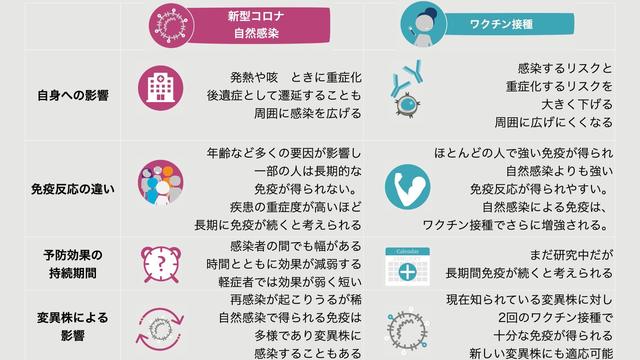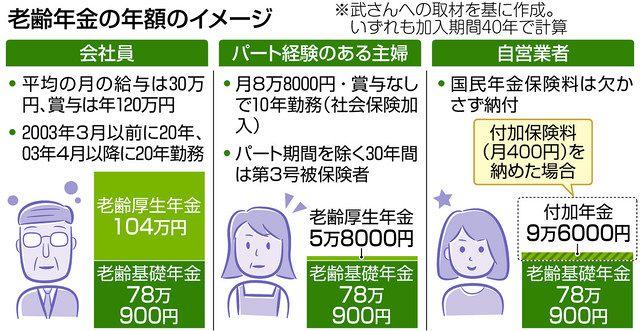×Science
While there is a preprint paper stating that "Infection with the new coronavirus may provide strong immunity," "Even if you have the virus, you should get the vaccine." Meanwhile, a study that simulated more than 3,800 types of mutations in the new coronavirus confirmed that there was a significant difference between the immunity acquired by virus infection and the immunity acquired by vaccination. Antibodies elicited by mRNA-1273 vaccination bind more broadly to the receptor binding domain than do those from SARS-CoV-2 infectionhttps://www.science.org/doi/10.1126/scitranslmed .abi9915How Immunity Generated from COVID-19 Vaccines Differs from an Infection – NIH Director's Bloghttps://directorsblog.nih.gov/2021/06/22/how- Emergence of "mutants of concern" represented by the delta strain of the new coronavirus As a result, there is concern that the immunity obtained from past infections and vaccinations will become less effective. Therefore, the research team of Jesse Bloom and Allison Greaney of the Fred Hutchinson Cancer Research Center in Seattle, USA, found that the spike protein protruding from the surface of the new coronavirus has a ``receptor binding site (RBD)'' part. conducted a study focused on
The RBD is the site that binds the receptor on the surface of human cells to the spike protein of the virus. If the RBD does not function, the virus cannot successfully enter human cells, so whether or not the RBD can be recognized is an important point for both ``immunity acquired from past infections'' and ``immunity acquired from vaccines.'' About. However, since many mutations can occur in RBD, even if the human immune system can recognize a specific RBD, it may not be able to deal with the emergence of a virus mutant with a different RBD structure. There is a nature. Therefore, the research team created a library covering about 3800 mutations that can occur in RBD. In parallel, we will examine how antibodies collected from people who have received two doses of Moderna's mRNA vaccine and those who have been infected with the new coronavirus in the past respond to these RBDs. Using a technique called "scan method", we investigated whether the immune system can respond appropriately to the RBD mutation.
Our findings show that vaccine-induced antibodies focused on the RBD, whereas antibodies induced by past infections often target non-RBD parts of the spike protein. It turns out. We also found that the immunity obtained by infection had a strong tendency to target specific parts of the RBD, whereas the vaccine immunity targeted various parts of the RBD evenly. Regarding the results of this study, Francis Collins, director of the National Institutes of Health, said, ``It was suggested that the difference in antibody identification methods is the difference between immunity due to infection and immunity due to vaccines. This means that the antibodies generated may be able to respond strongly to new strains of the new coronavirus, and more importantly, have experience recovering from COVID-19. It has also been shown that even in humans, a further protective effect can be expected by receiving vaccination."
It is not clear why there is such a difference between antibodies from vaccines and from infections. The research team speculates that the vaccine presents the viral proteins in a slightly different form, which may instead lead to the flexibility of the immune response to accommodate different RBD shapes. In addition, there is a view that ``the involvement of mRNA is important,'' and ``In ordinary infections, unless the disease is very severe, only the respiratory tract is exposed to the virus, whereas vaccines target muscles. There is also a theory that the immune system reacts more strongly because it is administered directly. Collins said, ``In any case, while the new coronavirus mutates in many ways like the normal human coronavirus that causes the common cold, vaccines do not respond to those mutations. It continues to be effective, so the best hope for winning the battle against the pandemic is to get as many people as possible vaccinated, regardless of whether they have ever had COVID-19. This not only saves lives, but also reduces the possibility of emergence of mutant strains that cannot be addressed by existing vaccines.”
Copy the title and URL of this article
・Related articleShould I be vaccinated even if I was infected with the new coronavirus in the past? -GIGAZINEInfection with the new coronavirus may provide strong immunity, but it should not be infected on purpose ” is not considered in the United States? -GIGAZINEResearch results that vaccination reduces the risk of sequelae of the new corona by half teeth? -GIGAZINE What kind of cell is the key "T cell" that can acquire immunity to the new coronavirus? -GIGAZINEPfizer Announces 'Booster Shot' of Three Vaccines Increases Protection Against Delta Mutants-GIGAZINE
・Related content
- Tweet
in Science, Posted by log1l_ks
You can read the machine translated English article here.







![Advantages of "Gravio" that can implement face / person recognition AI with no code [Archive distribution now]](https://website-google-hk.oss-cn-hongkong.aliyuncs.com/drawing/article_results_6/2022/2/25/98ceaf1a66144152b81298720929e8e7.jpeg)